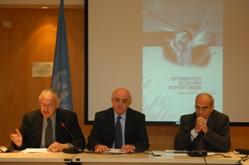
ESCWA held a press conference today in cooperation with the UN Information Center in Beirut (UNIC-Beirut), at the UN House to launch the "Information Economy Report 2009" released by the UN Conference on trade and Development (UNCTAD).
Speakers at the conference were Bahaa Elkoussy, UNIC-Beirut Director, Youssef Nusseir, Director Information and Communication Technology Division at ESCWA and Rami Zaatari, Information and Communication Technology Officer, ESCWA.
Elkoussy said that the importance and vitality of Information and Communication Technology (ICT) in the past decades has emerged as an engine that speeds up the pace of economic and social development. This technology has opened new horizons and prospects in developed and developing countries alike. The rapid penetration of information and communication technology in various parts of the world, particularly in the mobile phone and Internet sectors, has exceeded the expectations of most experts.
Elkoussy added that the mobile communication sector is capable of confronting the current economic crisis relatively well. However, the gap remains wide between the developed and developing worlds with respect to the availability of Internet service via broadband. "Despite the positive progress towards bridging this gap, there is still a long road to achieve equality among the various parts of the world on this matter," he said.
Nusseir, for his part, said that while the Information Economy Report 2009 discusses trends and future outlook, it focuses on the implications of the global economic crisis on ICT. The report looks at the progress that has been made and discusses different options for countries hoping to seize the opportunities created by new technologies.
Nusseir referred to the three chapters of the report. He said that In Chapter I, and in the context of analyzing ICTs for development, the report takes stock of recent trends with regard to extending connectivity worldwide. "Special attention is given to the challenge of providing broadband access to the Internet. Chapter II monitors development in enhancing the use of ICTs among enterprises and Chapter III looks at how international trade in ICT goods and in IT and ICT-enabled services is evolving. As the report was prepared in the midst of the most turbulent economic times since the Great Depression, potential implications of the economic crisis are discussed in all chapters," he added.
According to Nusseir, the dynamism of the different ICTs varies a great deal. While fixed telephone subscriptions are now in slight decline, mobile and internet usage continues to expand rapidly in most countries and regions. At the same time, there is a wide gap between high-income and low-income countries in the area of broadband connectivity. At the end of 2008, the number of fixed telecommunications subscriptions in the world was around 1.2 billion and the number of mobile subscriptions reached 4 billion. There were an estimated 1.4 billion internet users around the world at the end of 2008 and an estimated 400 million fixed broadband subscribers.
'While ICT goods belonged to the most dynamic areas of world trade until 2000, they have subsequently expanded less rapidly than global trade as a whole. Between 1998 and 2007, the value of exports of ICT goods rose from $813 billion to $1.73 trillion, representing 13.2 per cent of all merchandise trade, while it use to constitute 17.7% in 2000," Nusseir said.
The report acknowledged that there are concerns the current financial and economic crisis, which is the worst in 60 years, will negatively impact the positive trends in ICT diffusion and the investment needed in order to ensure universal access to ICTs. As of mid 2009, there was still great uncertainty about the degree to which it would affect different countries and economic sectors. The crisis is expected to influence developed and developing countries and various regions within developing countries differently. Many governments, faced with the current economic crisis, have identified enhanced ICT use as a strategy to quicken recovery. Several developed countries have made ICTs an integral part of their economic stimulus packages, both by stimulating the demand for ICT goods and by continuing to enhance the supply side.
Finally, Zaatari gave a PowerPoint presentation in which he referred to the ongoing growth in the use of mobile phones and a decline in the use of fixed lines. He said that some ESCWA countries, including Qatar, Bahrain, UAE and Oman, have ranked among top countries in terms of mobile penetration.





